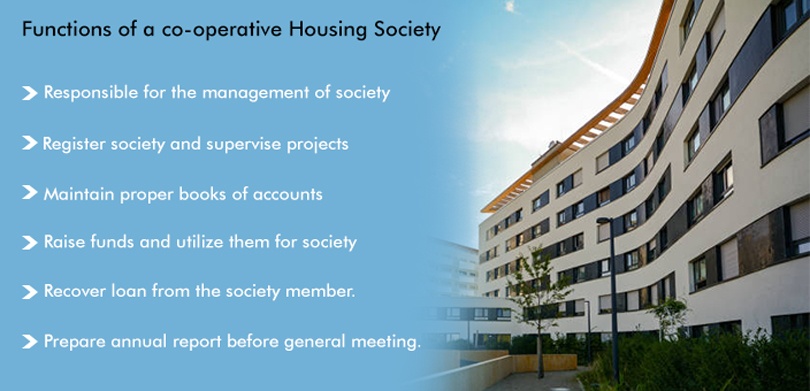Disclaimer:
With 11+ years of experience & expertise in the real estate industry, Homebazaar provides end-to-end property-buying solutions. Hundreds of 100% verified RERA-registered residential & commercial properties are listed on our website. We provide facilities like Zero brokerage, 360° virtual street view, quick site visit services, end-to-end property buying agreements & documentation guidance and low-interest home loan assistance. This helped us gain the trust of 55,000+ clients across India & sold 6,500+ homes of top reputed developers.
Page Contents
- What Is A Co-operative Housing Society?
- The Concept of Co-operative Housing Society
- How To Become A Member Of Co-operative Housing Society?
- The First Co-operative Housing Society In India
- Rules Of The Co-operative Housing Society
- Structure Of The Housing Society
- Types Of Co-operative Housing Societies
- Benefits Of A Co-operative Housing Society
- FAQs
What Is A Co-operative Housing Society?

A Co-operative Housing Society is a set-up that is developed from mutual consent and cooperation between various members. A Co-operative Housing Society is a formation between one or more residential buildings.
This membership-based legal entity brings all members with a community spirit together and follows the objective of working for the betterment of society.
The Co-operative Housing Society is a legally developed association. To improve the living status of the society members, the Co-operative Housing Society works strategically and responsively.
The co-operative laws register the Co-operative Housing Society. This entity follows the cooperative laws of their respective states.
The housing facility will include plots for housing, dwelling housing, open plots, or dwelling flats. This will help the members to receive basic amenities and services.
There are different values of the Co-operative Housing Society maintained by the members like mutual help, equality, self-responsibility, and solidarity.
The principles followed by the Co-operative Housing Society for maintaining their moral values are:

- Economic Participation of Members
- Educating and training members with the proper information
- Open and voluntary membership
- Cooperation and concern for the community
- Democratic control of members
- Independent and autonomy strong emphasis
The Concept of Co-operative Housing Society
The Co-operative Housing Society is a housing community that is registered by the government and owned by the members of the society.
The concept of community members is to mutually decide the framework of the society and work for improving the lifestyle of the residents. It is important to buy a few shares of the society if you want to become its member.
However, this will include the following functions of a co-operative housing society:

- The members of the Co-operative Housing Society should take ownership and manage all the functions of the society. If any resident rises any issue, then the members should manage it carefully.
- The construction project should be supervised by the members of the Co-operative Housing Society for which the society should be registered under the State Government.
- The members should maintain proper books of accounts along with other relevant documents.
- The members are liable to maintain the society on a timely basis by raising funds from residents. It is important to utilize the fund only for improvement projects in society.
- If any resident has taken a loan from the members of the Co-operative Housing Society, then it is the responsibility of all members to recover and repay the amount before the deadline.
- It is the responsibility of the Co-operative Housing Society members to prepare accurate annual reports like society audits, statements of accounts, complaint reports, and work performed before the general meeting.
How To Become A Member Of Co-operative Housing Society?

Before starting with the process of becoming a member of a Co-operative Housing Society, it’s important to decide which Co-operative Housing Society you want to join.
If you want to become a member of the Co-operative Housing Society, then it is necessary that you have an apartment there. The committee members should admit him/her as a member of society.
There are a few steps that are required to be followed apart from filling up the membership form for becoming a member of society:
- The person should pay in full for a minimum of 10 shares of the society along with paying for the membership application.
- The person should pay Rs 100 as an entrance fee.
- The person should give the application in a prescribed form as provided whether they own any other flat, or plot in the area of society.
- It is to be guaranteed by the person that the flat or plot will be used only for the stated purpose in the application and not for any other reason.
- The income of the person should be declared in the application. If they are dependent on any other member of the family, then that should also be specified.
- The person should also provide a copy of the stamped agreement with the builder for the flat or plot.
- The person should provide other declarations which are required under the bye-laws of the society.
The First Co-operative Housing Society In India

There has been significant growth in the Co-operative Housing Society movement during the initial 20th century.
The first cooperative housing society was established in 1909 in Karnataka as the Bangalore Building Cooperative Society.
The Bombay Co-operative Housing Association was established in 1913 in Maharashtra. During this time the association introduced a model bye-law and guided the development of all the cooperative housing societies.
When there was a requirement for funds and general insurance to carry out proper research, the National Co-operative Housing Society was developed in 1969.
The NCHS will do proper research and accordingly provide the state-level Co-operative Housing Federation with a solution.
Various central and state-level schemes were introduced to provide loans and financial assistance for land development to the housing societies under the jurisdiction.
To favor small and medium housing societies, the government has introduced various modifications to the previous laws of the housing society.
Rules Of The Co-operative Housing Society

The rules or the bye-laws of the Co-operative Housing Society are much similar in every state. We are providing a few Bye-laws of Maharashtra Co-operative Societies Rule 1961 for every chapter.
- Chapter I – Preliminary: In this chapter, the basic details of the society are provided like the name of the society, its registered address, and the procedure for changing the name and address.
- Chapter II – Interpretation: In this chapter, the definition of related words and terms are provided in detail along with their bye-laws number.
- Chapter III – Area Of Operation: In this chapter, the area of operation of the society is explained in detail. It is stated that the society member should clearly declare the restricted area of operation of the society.
- Chapter IV – Objects: In this chapter, the objects of the society are defined as managing the property, raising funds for the betterment of the society and etc.
- Chapter V – Affiliation: In this chapter, it is declared that the society will become an affiliated member of the Housing Federation of that Area.
- Chapter VI – Funds Raising, Their Utilisation, And Investment: In this chapter, the declaration for different terms are asked like mode of raising funds, share capital details, the limit of liabilities, investment of funds, etc.
- Chapter VII – Members, Their Rights, Responsibilities, And Liabilities: In this chapter, the explanation of membership terms, rights of members, and responsibilities & liabilities of the members.
- Chapter VIII – Levy Of Charges Of The Society: In this chapter, the declaration of different charges under different conditions of the society is provided like property taxes, lease rent, common electricity charges, retainer fees, etc.
- Chapter IX – Incorporation, Duties, And Powers Of The Society: In this chapter, society’s incorporation, its duties, and powers are declared clearly. The format of the structural audit is also provided.
- Chapter X – General Meetings: In this chapter, the format of the first general meeting, annual general body meeting, and special general body meeting are clearly defined.
- Chapter XI – Management Of The Affairs Of The Society: In this chapter, the rules and regulations for the society members are stated like the eligibility rule, disqualifying rule, etc.
- Chapter XII – Maintenance Of Account Books And Registers: In this chapter, the requirement of the books of accounts are declared. The transaction amount and the MSC rules are explained.
- Chapter XIII – Appropriation Of Profits: The deduction facility for different transactions and its percentage are provided in this chapter.
- Chapter XIV – Writing Off Of Outstanding Found Irrecoverable: In this chapter, the type of the society is declared, and the condition under which the society can write off any loan.
- Chapter XV – Audit Of Accounts Of Society: In this chapter, it is stated which documents are to be presented by the society if they appoint an external auditor to audit their accounts.
- Chapter XVI – Conveyance Of The Property, And Repairs To And Maintenance Of The Property: In this chapter, the steps for the conveyance of the land or building in favour of the society are provided.
- Chapter XVII – Other Miscellaneous Matters: Under this chapter, the miscellaneous matters like why it is important to notify each society member when there will be a general meeting.
- Chapter XVIII – Redressal Of Complaints: This chapter explains the importance of following the proper procedure for society complaints.
Here is the link to the complete Bye-laws of Maharashtra Co-operative Societies Rule 1961
Structure Of The Housing Society

Different structures of organizing and maintaining the society are followed in different Co-operative Housing Societies. However, all the processes can be organized into 4 main structures:
- National Co-operative Housing Federation of India: In 1969, the NCHF was developed to create basic guidelines for the Co-operative Housing Society of India to help in dealing with a different issue.
- State-level Apex Co-operative Housing Federation: The ACHFS works as the vital mediator between national, primary, and district federations. The ACHFS will directly report to the NCHFS.
- District Level Co-operative Housing Federation: This federation provides the primary housing co-operatives with financial assistance which are under their jurisdiction.
- Primary Level Co-operative Housing Society: The primary co-operative housing society is the society itself. They attain the legal status while registering themselves from the registrar of the Co-operative Societies under State Co-operative Societies Act.
Types Of Co-operative Housing Societies

As per the function of society, the Co-operative Housing Society is divided into different types which are explained in the below points:
- Tenant Ownership Housing Society: The society owns land or house under the Tenant Ownership Housing Society. However, they will lease the land or house to one member who will build their own house with their own money or by taking a loan from the society. Hence, the land will belong to the society held on lease by the member.
- Tenant Co-partnership Housing Society: The common name of Tenant Co-partnership Housing Society is the flat owner society because the land is owned by the society where they build houses for their members. The members have the right over the property by paying capital and rent to the society. As per the law, the possession of the land and building will remain with the society.
- House Mortgage Societies: The House Mortgage Societies are also called Credit Societies. The member can also avail mortgage from the society for the construction of the house.
- House Building Society: The House Building Society is also known as the House Construction Society. The construction of the building will be completed by the society on behalf of the members. After the completion of construction, the building will be transferred to the members. The amount spent on the construction will be recovered as a loan.
Benefits Of A Co-operative Housing Society

A Co-operative Housing Society is owned and managed by its members. Hence, the members enjoy some exclusive benefits of it which are the following:
- Affordable Financial Support: The Co-operative Housing Society is managed by its members which includes financial management as well. If any member has taken a loan mortgage from the society, then they can avail of a long mortgage term, affordable down payment, and low charges for pre-closure charges.
- Independent Governance: The members of the Co-operative Housing Society are the stakeholders of the society and they have equal rights and advantages. The members of the society vote and chooses the person who will manage the office work of the society.
- Secure and Reliable Investment: The Co-operative Housing Society has a separate legal existence that manages everything on its own. This helps the members to feel safe and secure because there is no intervention from outsiders. The members of the society are provided with an option to rent out or lease out their property for extra income when they are not residing.
- Divided Responsibilities: In a Co-operative Housing Society, the members have equal rights on benefits. Hence, they are also liable to pay for the maintenance of society equally. Whether it’s a repair cost, insurance expense, or maintenance cost, the members will pay for it evenly. The members have a say during the process of construction of the building as well regarding the design and planning.
- Best Amenities and Services: The members of the society are provided with the amenities to follow their hobbies and upgrade their skills. It is the responsibility of society members to understand the requirements and provide the best available services.
FAQs
| Q: What are the features of a Co-operative Housing Society?
Ans: The features of a Co-operative Housing Society are a separate legal entity, shared responsibility among the members, voluntary association, and managed control. |
| Q: What is the difference between a housing society and a Co-operative housing society?
Ans: There is no difference between a housing society and a co-operative housing society. Both the terms are used interchangeably. |
| Q: What are the classifications of a Co-operative housing society?
Ans: The classifications of a co-operative housing society are Tenant Ownership Housing Society, Tenant Co-partnership Housing Society, House Mortgage Societies, and House Building Society. |
| Q: What are the advantages of a Co-operative housing society?
Ans: The advantages of a co-operative housing society are Affordable Financial Support, Independent Governance, Secure and Reliable Investment, Divided Responsibilities, and Best Amenities and Services. |
| Q: What are the problems faced by a Co-operative housing society?
Ans: The problems faced by a Co-operative housing society are incapable management, limited resources, limited consideration, lack of secretiveness, government intervention, and inflexible business practices. |








